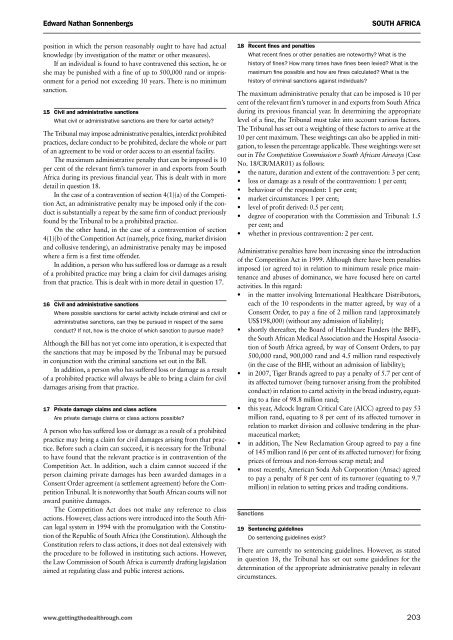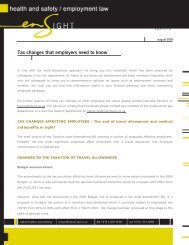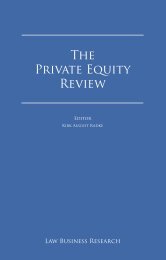Cartel Regulation 2009 - ENS
Cartel Regulation 2009 - ENS
Cartel Regulation 2009 - ENS
Create successful ePaper yourself
Turn your PDF publications into a flip-book with our unique Google optimized e-Paper software.
Edward Nathan Sonnenbergs<br />
South Africa<br />
position in which the person reasonably ought to have had actual<br />
knowledge (by investigation of the matter or other measures).<br />
If an individual is found to have contravened this section, he or<br />
she may be punished with a fine of up to 500,000 rand or imprisonment<br />
for a period not exceeding 10 years. There is no minimum<br />
sanction.<br />
15 Civil and administrative sanctions<br />
What civil or administrative sanctions are there for cartel activity<br />
The Tribunal may impose administrative penalties, interdict prohibited<br />
practices, declare conduct to be prohibited, declare the whole or part<br />
of an agreement to be void or order access to an essential facility.<br />
The maximum administrative penalty that can be imposed is 10<br />
per cent of the relevant firm’s turnover in and exports from South<br />
Africa during its previous financial year. This is dealt with in more<br />
detail in question 18.<br />
In the case of a contravention of section 4(1)(a) of the Competition<br />
Act, an administrative penalty may be imposed only if the conduct<br />
is substantially a repeat by the same firm of conduct previously<br />
found by the Tribunal to be a prohibited practice.<br />
On the other hand, in the case of a contravention of section<br />
4(1)(b) of the Competition Act (namely, price fixing, market division<br />
and collusive tendering), an administrative penalty may be imposed<br />
where a firm is a first time offender.<br />
In addition, a person who has suffered loss or damage as a result<br />
of a prohibited practice may bring a claim for civil damages arising<br />
from that practice. This is dealt with in more detail in question 17.<br />
16 Civil and administrative sanctions<br />
Where possible sanctions for cartel activity include criminal and civil or<br />
administrative sanctions, can they be pursued in respect of the same<br />
conduct If not, how is the choice of which sanction to pursue made<br />
Although the Bill has not yet come into operation, it is expected that<br />
the sanctions that may be imposed by the Tribunal may be pursued<br />
in conjunction with the criminal sanctions set out in the Bill.<br />
In addition, a person who has suffered loss or damage as a result<br />
of a prohibited practice will always be able to bring a claim for civil<br />
damages arising from that practice.<br />
17 Private damage claims and class actions<br />
Are private damage claims or class actions possible<br />
A person who has suffered loss or damage as a result of a prohibited<br />
practice may bring a claim for civil damages arising from that practice.<br />
Before such a claim can succeed, it is necessary for the Tribunal<br />
to have found that the relevant practice is in contravention of the<br />
Competition Act. In addition, such a claim cannot succeed if the<br />
person claiming private damages has been awarded damages in a<br />
Consent Order agreement (a settlement agreement) before the Competition<br />
Tribunal. It is noteworthy that South African courts will not<br />
award punitive damages.<br />
The Competition Act does not make any reference to class<br />
actions. However, class actions were introduced into the South African<br />
legal system in 1994 with the promulgation with the Constitution<br />
of the Republic of South Africa (the Constitution). Although the<br />
Constitution refers to class actions, it does not deal extensively with<br />
the procedure to be followed in instituting such actions. However,<br />
the Law Commission of South Africa is currently drafting legislation<br />
aimed at regulating class and public interest actions.<br />
18 Recent fines and penalties<br />
What recent fines or other penalties are noteworthy What is the<br />
history of fines How many times have fines been levied What is the<br />
maximum fine possible and how are fines calculated What is the<br />
history of criminal sanctions against individuals<br />
The maximum administrative penalty that can be imposed is 10 per<br />
cent of the relevant firm’s turnover in and exports from South Africa<br />
during its previous financial year. In determining the appropriate<br />
level of a fine, the Tribunal must take into account various factors.<br />
The Tribunal has set out a weighting of these factors to arrive at the<br />
10 per cent maximum. These weightings can also be applied in mitigation,<br />
to lessen the percentage applicable. These weightings were set<br />
out in The Competition Commission v South African Airways (Case<br />
No. 18/CR/MAR01) as follows:<br />
• the nature, duration and extent of the contravention: 3 per cent;<br />
• loss or damage as a result of the contravention: 1 per cent;<br />
• behaviour of the respondent: 1 per cent;<br />
• market circumstances: 1 per cent;<br />
• level of profit derived: 0.5 per cent;<br />
• degree of cooperation with the Commission and Tribunal: 1.5<br />
per cent; and<br />
• whether in previous contravention: 2 per cent.<br />
Administrative penalties have been increasing since the introduction<br />
of the Competition Act in 1999. Although there have been penalties<br />
imposed (or agreed to) in relation to minimum resale price maintenance<br />
and abuses of dominance, we have focused here on cartel<br />
activities. In this regard:<br />
• in the matter involving International Healthcare Distributors,<br />
each of the 10 respondents in the matter agreed, by way of a<br />
Consent Order, to pay a fine of 2 million rand (approximately<br />
US$198,000) (without any admission of liability);<br />
• shortly thereafter, the Board of Healthcare Funders (the BHF),<br />
the South African Medical Association and the Hospital Association<br />
of South Africa agreed, by way of Consent Orders, to pay<br />
500,000 rand, 900,000 rand and 4.5 million rand respectively<br />
(in the case of the BHF, without an admission of liability);<br />
• in 2007, Tiger Brands agreed to pay a penalty of 5.7 per cent of<br />
its affected turnover (being turnover arising from the prohibited<br />
conduct) in relation to cartel activity in the bread industry, equating<br />
to a fine of 98.8 million rand;<br />
• this year, Adcock Ingram Critical Care (AICC) agreed to pay 53<br />
million rand, equating to 8 per cent of its affected turnover in<br />
relation to market division and collusive tendering in the pharmaceutical<br />
market;<br />
• in addition, The New Reclamation Group agreed to pay a fine<br />
of 145 million rand (6 per cent of its affected turnover) for fixing<br />
prices of ferrous and non-ferrous scrap metal; and<br />
• most recently, American Soda Ash Corporation (Ansac) agreed<br />
to pay a penalty of 8 per cent of its turnover (equating to 9.7<br />
million) in relation to setting prices and trading conditions.<br />
Sanctions<br />
19 Sentencing guidelines<br />
Do sentencing guidelines exist<br />
There are currently no sentencing guidelines. However, as stated<br />
in question 18, the Tribunal has set out some guidelines for the<br />
determination of the appropriate administrative penalty in relevant<br />
circumstances.<br />
www.gettingthedealthrough.com 203





